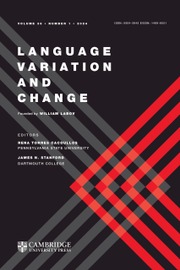Article contents
How gradual change progresses: The interaction between convention and innovation
Published online by Cambridge University Press: 23 February 2016
Abstract
This paper hypothesizes that as an expression becomes more frequent in one grammatical context, its mental retrievability improves, which in turn makes it more easily available in different yet closely related (analogous) grammatical contexts. Such a mechanism can account for the progression of gradual change. The hypothesis generates two testable predictions. First, innovative constructions should be more likely to emerge if their analogical models are better entrenched. Second, an expression's retrievability can also be improved by priming, which in the short term should have a similar effect to entrenchment. These predictions are tested against the development of the noun key into an adjective (as in a very key argument). The change is gradual, starting with increased productivity of compounds with key as specifying element, leading later to debonded and clearly adjectival uses. The development of key is analyzed using data from the British Houses of Parliament. The effect of entrenchment is tested against individual variation. Next, situations are investigated where key has been primed, either by an earlier instance of key or by a collocate of key. The evidence supports the hypothesis. Innovative uses of key are favored under conditions that improve the retrievability of its more conventionalized uses.
- Type
- Research Article
- Information
- Copyright
- Copyright © Cambridge University Press 2016
References
REFERENCES
- 54
- Cited by


